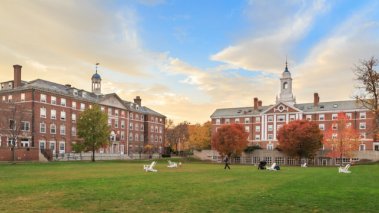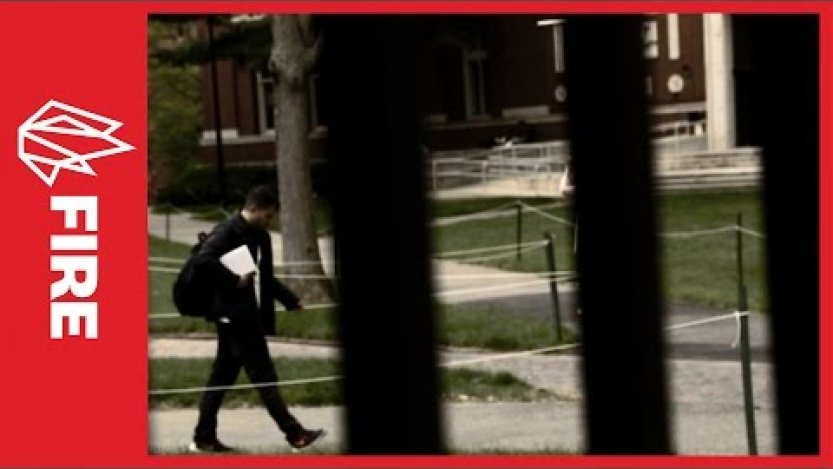Table of Contents
Faculty, Students Take on Harvard Admins over Final Club/Greek Org Blacklist

This week, the regularly scheduled meeting of the Harvard Faculty of Arts and Sciences was dominated by a discussion of a resolution introduced by 12 faculty members aimed at rolling back the university’s controversial decision earlier this year to deny some leadership and educational opportunities to student members of single-sex final clubs and Greek organizations.
As FIRE reported in May, Harvard President Drew Gilpin Faust, acting on the recommendation of Harvard College Dean Rakesh Khurana, announced that beginning with next year’s incoming class, any Harvard student who joins an unrecognized single-sex organization will be banned from captaining intercollegiate sports teams, denied the ability to lead recognized student organizations, and will not receive the dean’s recommendation necessary to receive Rhodes and Marshall scholarships. (Single-sex fraternities, sororities, and Harvard-specific “final clubs” have not been recognized by the university and have been located off campus since 1984.)
Since then, Harvard administrators have stubbornly stuck to this policy, despite concerns voiced by FIRE and others that blacklisting students based on membership in outside organizations is totally incompatible with the idea of freedom of association. Students have protested as well.
Harvard’s actions this year also conflict with its decision in the 1992 Verba Report, which discussed the status of Harvard students who wished to be part of military ROTC programs that Harvard found to be discriminatory. That report called a move to ban Harvard students from joining ROTC “a paternalistic policy inconsistent with Harvard's general approach. It would single out ROTC for disadvantageous treatment compared to other outside organizations or funding sources, and would seek to extend the reach of Harvard's non-discrimination policy beyond its proper boundaries.”

Harvard has reportedly made some concessions within the policy that invite more questions than answers. For instance, The Harvard Crimson, despite being a recognized student organization, will—for unspecified reasons—be exempt from the policy and may choose its editors freely. In addition, the Crimson reported in August that Dean Khurana had told members of the Seneca, an all-female final club, that as long as they wrote the gender requirements out of its bylaws, it could go right on only selecting females for membership. Okaying such a “wink-and-nod” single-sex status is morally indefensible and worse than pointless in terms of eliminating discrimination.
That brings us to this month’s faculty meeting, where faculty discussed the resolution that would hopefully reverse Harvard’s decision.
Introduced by Professor Harry R. Lewis, former Dean of Harvard College, the resolution is short and to the point. It reads:
Harvard College shall not discriminate against students on the basis of organizations they join, nor political parties with which they affiliate, nor social, political or other affinity groups they join, as long as those organizations, parties, or groups have not been judged to be illegal.
While this seems like a no-brainer, it was anything but in the Harvard faculty meeting, which was presided over by President Faust herself. FIRE board member and Harvard biology professor Richard Losick, who is among the sponsors of the resolution, noted during the meeting that “[t]he University is a community based on the free exchange of ideas. The way to challenge ideas we don’t agree with, or membership in organizations we don’t like, is by debate and open discussion and by creating attractive alternatives, not by coercion.”
Harvard Magazine also carried a lengthy excerpt of Professor Lewis’s eloquent comments in favor of the motion. They’re well worth reading in full, but this excerpt is particularly powerful:
The policy teaches our students, who watch everything we do, bad lessons. It is illiberal—it teaches students that it is OK to sacrifice basic individual freedoms in pursuit of large but only vaguely related social goals.
Our sights should be set higher. Part of our commitment to diversity is our institutional confidence that students may think differently than we do, and may make private choices of which we disapprove. By all means, if we conclude that students should not visit or join these organizations, let’s tell them they shouldn’t go, and why. Let’s tell them loudly and clearly and persistently. If students behave badly, anywhere, then by all means let us hold them accountable for their actions. And of course, we should continue to adhere to this Faculty’s standards of inclusivity for official Harvard student organizations—the standards we vote every year.
But our long history should have taught us some humility about our capacity to make the best private choices for our students. Let us teach and model our values as best we can. But to make rules for students about their private lives is to admit our own failure to persuade them, through evidence and reason, to live up to our ideals.
While professors spoke both for and against the motion, the most interesting other takeaway was President Faust’s and the administration’s refusal to say whether or not Harvard would actually abide by the faculty’s decision. Harvard has a uniquely powerful faculty governance system, and as Lewis points out on his website:
[a]ccording to the Fifth Statute of the University, Harvard College is in the “immediate charge of the Faculty of Arts and Sciences.” Policies about who may receive fellowship nominations and who may be captain of a team or president of a student group are therefore matters under the purview of the FAS, whose elected representatives on the Faculty Council were not consulted before this policy was imposed.
Yet, when asked if the administration would abide by the faculty’s decision in the matter, Faust, according to the Crimson, “declined to answer yes or no, instead encouraging faculty to consider closely ‘the urgency of the problem’ of the single-gender organizations.” It remains to be seen, then, whether the faculty will use this opportunity to resist what appears to be an administrative power grab, or allow a precedent to be set that would firmly establish the declining power of faculty governance at Harvard.
Faculty are not the only ones with concerns. At a town hall meeting in mid-October, students asked tough questions about the policy that those tasked with implementing it were hard-pressed to answer. For example, Harvard music professor Kay K. Shelemay is one of two co-chairs of the implementation committee for the policy, yet according to the Crimson she “hesitated at times, however, to offer a full-throated defense of the administration’s policy… After one attendee asked whether his all-male final club affiliation should disqualify him from eligibility for the Rhodes—one of the key tenets of the policy—Shelemay said, ‘I hesitate to speak for Dean Khurana, and I did not design the policy.’”
Students asked other good questions, too, which Shelemay and her fellow town-hall leader, Associate Dean of Student Life David R. Friedrich, did not sound well-prepared to answer:
“[My question is] why this town hall that has generated such meaningful questions and conversations did not take place before the policy was announced to us in May?” Yasmin Z. Sachee ’18 asked.
After addressing another of Sachee’s questions, Shelemay asked if Friedrich “want[ed] to speak to why it wasn’t held earlier.”
Following laughs from the audience and seconds of silence from Friedrich, Shelemay continued the discussion.
“Oh dear, never mind. Clearly no one thought of doing it last spring but it’s nice that we’re doing it now,” Shelemay said.
“I’m sorry it wasn’t held before,” she added.
The faculty will reportedly vote on the motion at its December meeting. Professor Lewis has requested that the vote be by paper ballot rather than the usual verbal vote.
FIRE will keep you updated on developments.
UPDATE, November 5, 2016: This article has been changed to indicate that Professor Lewis has requested that the vote on the motion be taken by paper ballot. The faculty will need to vote on whether to do so.
Recent Articles
FIRE’s award-winning Newsdesk covers the free speech news you need to stay informed.

VICTORY: Michigan town declares Sept. 6 ‘First Amendment Day’ after FIRE sues its mayor for shouting down residents

USC canceling valedictorian’s commencement speech looks like calculated censorship

Back into the FIRE: Hasen’s response to FIRE and Rohde: Don’t read the press clause out of the Constitution — First Amendment News 420
